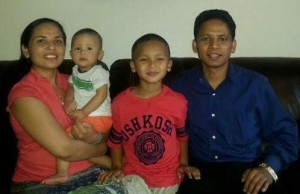A Citizen for the First Time

For the first time in his life, Dal Diyali will be a citizen of a country.
He speaks with pride and excitement about his preparations to apply for United States citizenship and to take the official citizenship test. “It will be the first time I officially will be able to call a country my own,” he explains.
Ethnically Nepali Bhutanese residents can apply for legal citizenship at age eighteen, but Dal fled Bhutan when he was fourteen, so he has never held citizenship. After his escape from Bhutan, he lived in UNHCR-managed refugee camps in eastern Nepal.
“I was country-less for over eighteen years,” says Dal. “I wasn’t a citizen of any country in the world. I couldn’t enjoy the typical rights of citizens. I didn’t have legal protection, the ability to travel freely with a passport, the right to vote, or even the feeling of security.”
In 2008, Dal and his family came to the United States through a third-country resettlement program. They were warmly received and resettled by the International Rescue Committee in Seattle. Because of Dal’s English language skills, he began work as an assistant caseworker for the IRC and was quickly promoted to caseworker. In September of 2012, he returned to his educational background by applying for a position as the IRC in Seattle’s Finance Assistant.
“The IRC helped me become self-reliant, and now, five years later, it is preparing me and my family for citizenship,” Dal says. He and his wife are planning to take the citizenship test together in the upcoming months.
The difference that citizenship will make is important to Dal and his family, especially to his two young children. Without citizenship, education and employment opportunities are often closed. Now, he and his family will be able to vote, to be represented, and to be protected under citizenship rights. “As a citizen, I can feel responsibility towards this nation,” he declares. “I’ll finally have a sense of belonging and a feeling of protection. I will show the country my patriotism and commitment.”
Of the many benefits of citizenship, Dal is especially looking forward to travelling. With a U.S. passport, he will be able to travel freely in order to visit his scattered family members. Plus, he is eager to expand his knowledge of the world and to continue to be a cultural ambassador. He says, “When I travel, I can represent this country as a person still interested in learning about new cultures. I can introduce those cultures to my fellow U.S. citizens.”
Dal describes his new life in the U.S. as hopeful, a stark difference from his past. “In Bhutan and in the refugee camps of Nepal, there was hardship and uncertainty. No hope and nowhere to go,” he says. “Now, I have everything. I have certainty. I can say I’m a part of this nation.”
Written by Julie Feng, member of the Volunteer Writer Corps
Sourced: International Rescue Committee
